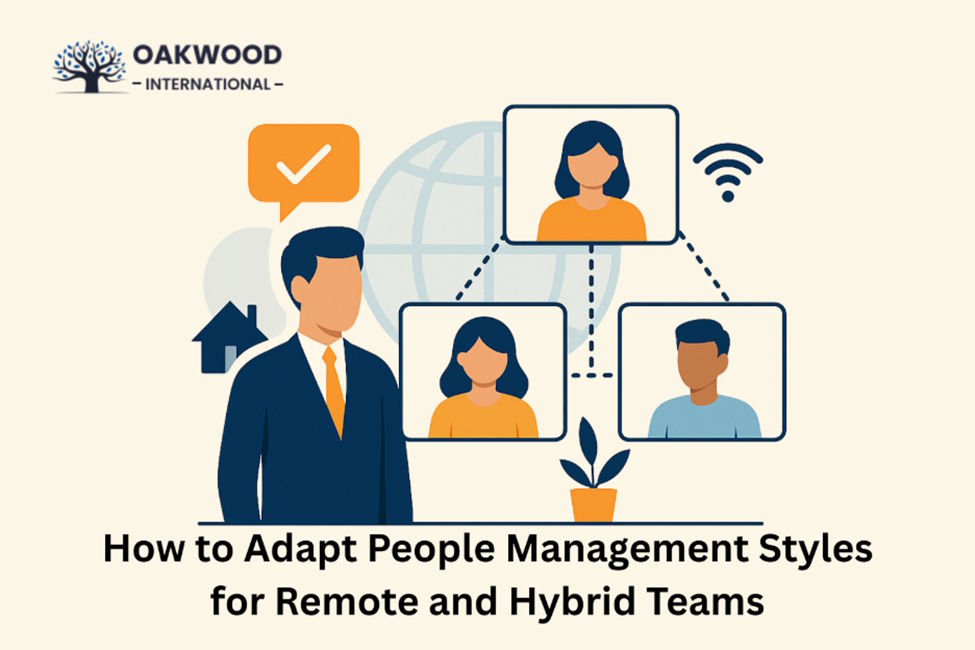Managing people has never been an art, and today’s mix of remote and hybrid teams makes it even more complex. If you are working towards a CIPD Level 3 certificate, you already know how important it is to adjust your style to different situations. Leading from a distance requires more than just setting tasks. It is about using your People Management Skills to create trust and support your team wherever they are. The real question is, how do you make that shift in practice? Let’s explore practical strategies that work.
Table of Contents
- Strategies for Managing Remote and Hybrid Teams
- Conclusion
Strategies for Managing Remote and Hybrid Teams
Strong leadership in flexible workplaces requires thoughtful approaches that keep people connected and motivated. Below are the strategies that can help you adapt effectively:
Building Trust in Virtual Spaces
The foundation of successful teams is trust. Managers cannot rely on brief desk conversations in remote or hybrid environments. Rather, consistency is the foundation of trust. People feel appreciated when you follow through on commitments and make decisions in a transparent manner. Leaders who are adept at this foster an environment where team members may freely express their opinions without worrying about criticism.
Clear Communication is the New Superpower
In the absence of physical presence, little miscommunications can escalate into major problems. Clear communication is more important than ever. Supervisors should use written updates for clarity and video calls for intricate conversations. Everyone will understand their job and feel included if open communication is promoted. Because employees want to feel that their opinions are valued, active listening practices help improve relationships.
Flexibility as a Core Principle
It is best for managers of remote and hybrid teams to be able to react to different needs. Being flexible with tools and ways of doing things shows that you care and value them. People can better balance their personal and work needs when their leaders are flexible. This not only boosts mood but also makes people work harder. An open style also makes it easier for managers to get in touch with, which is very important when teams are spread out.
Focusing on Outcomes Not Hours
Time at the desk is less significant in a remote or hybrid world than the outcomes attained. Supervisors must turn their focus to results. Clearly defining objectives and evaluating performance in relation to them fosters equity throughout the team. This method emphasises the importance of producing high-quality work while removing the strain of being continuously visible online. Employee motivation is increased when they feel trustworthy.
Building Team Spirit Online
In the absence of a shared workplace setting, team spirit may wane. Supervisors must establish areas for casual communication, including online coffee breaks or group exercises. These chances improve interpersonal connections and facilitate teamwork. Strong ties to the community help employees feel less alone and that they're a part of something greater. Every contact is energised by leaders who cultivate a sense of teamwork.
Supporting Employee Wellbeing
The distinction between home and business life may become hazy when working remotely. Effective managers keep an eye out for symptoms of stress and burnout. Sincere concern is demonstrated by providing support resources and encouraging regular pauses. Employees are more engaged and devoted when they feel supported. Instead of being an afterthought, well-being ought to be a frequent topic of discussion. People come first, as this illustrates.
Developing Leaders for the Future
Changing management approaches is a continuous process. It calls for constant learning and development. Managers are better prepared to face the difficulties of evolving work environments when they make an investment in honing their people management abilities. In order to develop leaders who can motivate teams both in person and virtually, training, mentoring, and credentials are important factors.
Using Technology to Build Connections
Being able to manage remote and mixed teams better with the right tools is very important. Everyone stays on the same page with platforms for quick messaging, working together, and keeping track of projects. Managers should pick tools that everyone can use and that are easy to access. Even more importantly, technology should not replace human interaction, it should help it. It can bring people together, no matter where they work, if it is used correctly.
Conclusion
Remote and hybrid teams demand managers who are flexible and skilled at building connections across distances. From communication to wellbeing, adapting your style ensures people feel supported and engaged no matter where they work. Strong leadership here is not about control but about creating trust and community. To strengthen your approach, consider how Oakwood International can support your journey towards mastering people management in today’s workplace.








